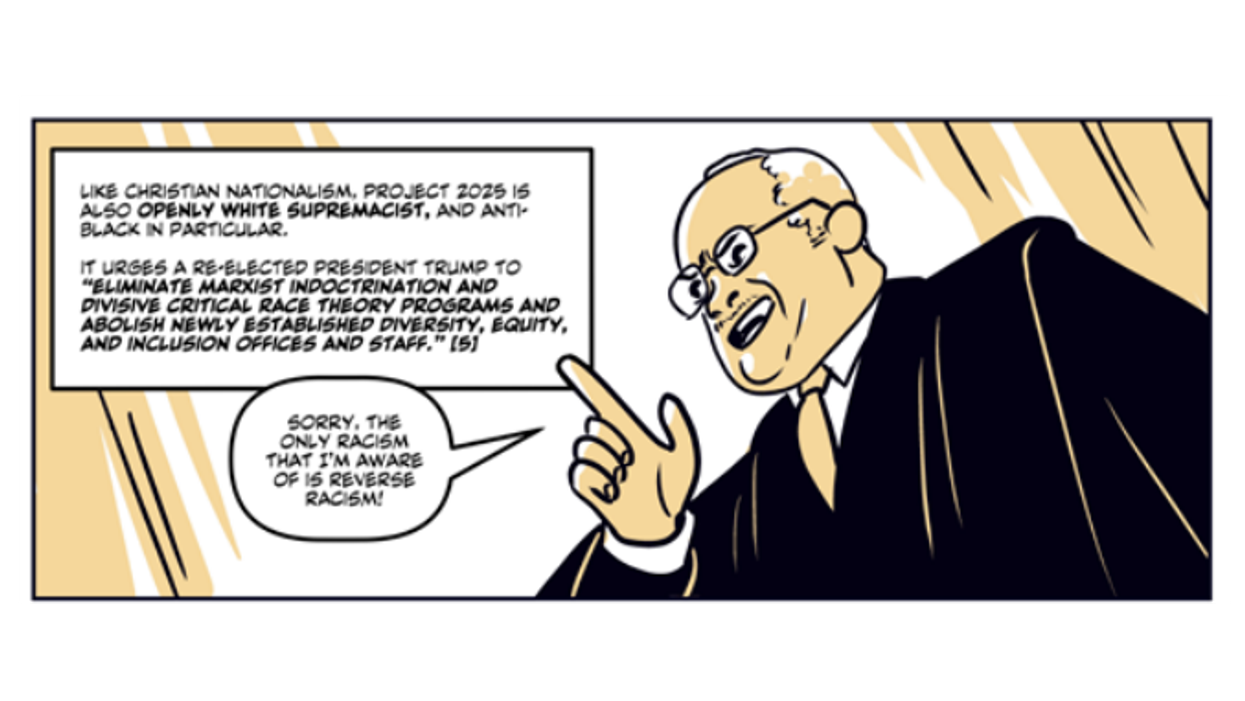Toliver is an assistant professor of curriculum and instruction at the University of Illinois, Urbana-Champaign and a public voices fellow with The OpEd Project.
Recently, a group of comic book writers and authors published “ Stop Project 2025: A Comics Guide to the Republican Plan to End Democracy.” Free to the public, the guide aims to succinctly explain the Heritage Foundation’s 900-page blueprint for Donald Trump to overhaul the executive branch of government when he is sworn into office for the second time.
The future of democracy may seem an unlikely topic for comic book treatment, but the genre has long transcended the likes of Marvel superheroes. And in an era when civic literacy is in peril, we need them more than ever.
Indeed, comics can serve as a vital bridge between intricate policy discussions and everyday understanding. By tackling critical issues like education, health care, libraries, teachers and voting, the comic initiative transforms complex, jargon-laden policy into accessible comic narratives that bring all readers into the conversation. After all, if people can’t understand the rules of the game, how can they participate meaningfully in it?
Historically, comic books have been dismissed as children’s media, but their capacity to convey complex ideas and engage in social and political commentary has been widely underestimated. Comic books have a long history of addressing social issues. For instance, the X-Men series is an allegory for racial discrimination in the United States, illustrating the struggles of marginalized groups in a white patriarchal capitalist society. Superman, since his introduction, has fought for social justice, and his story serves as a “ metaphor for refugees and immigrants ” in the United States. Similarly, Luke Cage, as a Black superhero from Harlem, confronts systemic injustices and the challenges of urban life, highlighting the complexities of race and class disparities in America. These stories and others demonstrate that comics can be a powerful platform for social commentary.
In an era dominated by dense legal texts and political rhetoric that can alienate even the most engaged citizens, comics stand out as a powerful tool for demystifying intricate ideas and providing people the basic information they need to make informed decisions that will help them to participate meaningfully in civic life. By simplifying content and sparking interest in issues that directly affect people’s lives, comics make political discourse more relatable and engaging.
Of course, there is undeniable value in reading original documents, no matter the length. But the United States faces a reading epidemic marked by dwindling literacy rates and a society increasingly disengaged from longer narratives. We find ourselves inundated with quick, bite-sized content — memes, reels, shorts and curated social media posts — that demand little of our attention and often prioritize entertainment over education. In this context, comics offer a refreshing alternative, allowing for a deeper exploration of important topics in a format that captures attention and encourages reflection.
The visual storytelling inherent in comics can also attract diverse audiences, including young people, busy parents and those who might feel intimidated by traditional political discourse. By presenting multifaceted issues through relatable characters and narratives, comics invite readers to engage in conversations about the world around them. They break down barriers, making it easier for people to grasp the implications of policies that impact their lives.
As an example, Project 2025, if fully realized, could reshape American society, impacting everything from personal freedoms to public education. The potential consequences of such policies warrant serious attention and discussion. Yet, many citizens, even avid readers, may not have the time or inclination to wade through nearly a thousand pages of dense legalese.
By utilizing a medium that resonates with multiple audiences, the creators of the comics guide are not just educating; they are empowering. They provide readers with the tools to question, discuss and advocate for their rights by presenting information in an accessible manner.
In a media landscape dominated by rapid-fire media and soundbites, initiatives like Stop Project 2025 remind us that effective democracy relies on an informed public. Knowledge is power, and in a democratic society, an informed citizenry is the bedrock of effective governance. By encouraging critical thinking and open dialogue, we can cultivate a society where citizens actively shape their future.
Ultimately, as we face significant challenges to our democratic institutions, we must recognize that understanding the rules of the game is essential for meaningful participation. By embracing innovative approaches to communication, we can inspire a new generation of informed citizens who feel empowered to engage with the democratic process. As we navigate the complexities of modern governance, we must leverage tools like comics to ensure that essential information is accessible and engaging. In doing so, we can reignite a passion for reading and foster a more critically engaged citizenry, one comic at a time.




















Trump & Hegseth gave Mark Kelly a huge 2028 gift